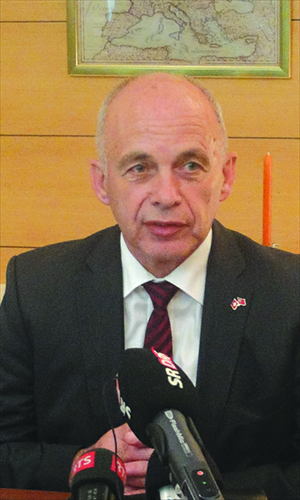Neutrality foundation of Sino-Swiss ties

Ueli Maurer Photo: Zhang Ni
Editor's Note:
The Sino-Swiss relationship, traditionally friendly, has become even closer of late. After the Swiss Federal Councilor and Minister of Economy Johann Schneider-Ammann led a large economic delegation to China and signed a free trade agreement (FTA) with China in early July, Swiss President Ueli Maurer (Maurer) came to Beijing in mid-July for talks with Chinese President Xi Jinping. Switzerland is the first continental European country to have signed an FTA with China. What does Switzerland think of the FTA with China? What does China mean to Switzerland? Global Times (GT) reporter Zhang Ni talked to Swiss President Ueli Maurer on these issues.
GT: During your recent visit to China, you had a meeting with President Xi, could you share with us the main contents of your meeting?
Maurer: The main purpose of this visit to China is to establish a friendly and trustworthy bilateral FTA with China's new government, and I hope it can be well implemented in the future.
We have already held three economic dialogues, and this year there should be some specific measures.
We also talked about the topic of finance, and both sides agreed to carry out a dialogue on financial issues.
The first round of the financial dialogue will be held this year. In such circumstances, we have also discussed the bilateral double taxation agreement which is ready to be signed, as well as the internationalization of the yuan.
We also mentioned the challenges of the next few decades. Our assessments of the situation were very similar.
Switzerland has a certain advantage in environmental protection. It has achieved great progress in air, water and soil protection and other fields. It also has complex legislation in environmental protection.
China is developing while trying to solve these problems in the global order. This is a really fascinating discussion.
We have achieved successful cooperation and dialogue on the basis of mutual trust with the new Chinese leadership.
I believe we can seek answers for issues to be solved together with Chinese partners. Meanwhile, we are more confident that friendly and long-term relationship will certainly benefit the two peoples.
GT: How do you see Switzerland becoming the first continental European country to have signed an FTA with China?
Maurer: With the signing of an FTA this year, bilateral relations have reached a new high.
China is significant to Switzerland not only because China's economy is becoming more attractive. Meanwhile for Switzerland, to have China as a partner in the process of global integration is very attractive.
For me, it is very important to re-establish and maintain bilateral relations at the highest level after the new leaders of China are in the office. During my visit to China, talks arranged by the host have been open and without much red tape.
GT: How would you rate the Sino-Swiss FTA? What are the influences it will have on the economic cooperation between the two countries?
Maurer: I must honestly say that we should not overestimate the immediate effects of the FTA on tariff reductions, as some of the reductions are phased. But I think the FTA is a political signal.
I see this agreement as an open door. We opened a door through which China and Switzerland can communicate with each other, enterprises can have more development opportunities, and many Swiss people can explore the Chinese market.
GT: Switzerland was also one of the first Western countries to acknowledge the People's Republic of China. Why is Switzerland's political and economic exchanges attitude toward China different from other Western countries?
Maurer: The relationship between Switzerland and China, in essence, is based on the neutrality of Switzerland. This neutrality made Switzerland one of the first countries to recognize the People's Republic of China.
Neutrality is the characteristics of an emphasis on solidarity; we believe that all countries are the same, so we are not concerned about other countries' internal affairs.
Neutrality is also demonstrated in the belief that all men are created equal within the country. This feature also allows us to support the one-China policy, which has been the Swiss government's unswerving position.
In addition, from the Chinese perspective, Switzerland may be China's experimental market in Europe.
Switzerland and China's good relationship today is not a result accomplished within a few weeks or a few years, but proof of decades of sustained, stable and reliable diplomatic relations of trust.
GT: What are other areas in which there is room for further cooperation between China and Switzerland?
Maurer: Chinese people are the most important customers of Swiss watches, and China has become the largest sales market for Swiss watches.
Of course, this is only part of economic cooperation between the two countries.
China has a certain influence on Switzerland's economic status, especially in terms of trade and cooperation over raw materials.
Switzerland today has become the most important raw material trading platform, and China is also interested in Switzerland's capacity to use raw materials in production.
The future of bilateral cooperation has great potentials in the machine tool industry, the chemical industry and the pharmaceutical industry.
We have a very good foundation and technology ranging from the food industry to high-tech industries.
We hope that the Chinese government can effectively cooperate with us. In this way, both sides can achieve good experiences.